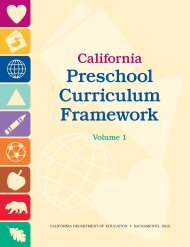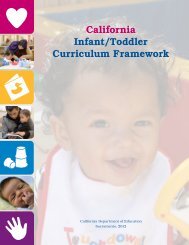Infant Toddler Learning & Development Foundations
Infant Toddler Learning & Development Foundations
Infant Toddler Learning & Development Foundations
Create successful ePaper yourself
Turn your PDF publications into a flip-book with our unique Google optimized e-Paper software.
LANGUAGE DEVELOPMENT<br />
44<br />
development is fundamentally the<br />
same across cultures and languages.<br />
In describing early language development,<br />
Kuhl (2002, 115) states: “One<br />
of the puzzles in language development<br />
is to explain the orderly transition<br />
that all infants go through during<br />
development. <strong>Infant</strong>s the world over<br />
achieve certain milestones in linguistic<br />
development at roughly the same time,<br />
regardless of the language they are<br />
exposed to.”<br />
Perceptual processes play an important<br />
role in language development. As<br />
Gogate, Walker-Andrews, and Bahrick<br />
(2001, 13) note: “A diverse set of experimental<br />
findings suggests that early<br />
lexical comprehension owes much to<br />
infants’ developing ability to perceive<br />
intersensory relations in auditoryvisual<br />
events,” [for example, speech].<br />
Experience also affects language<br />
development from very early in life.<br />
One of the ways experience influences<br />
language development is through its<br />
impact on perception early in infancy.<br />
Prior to infants’ first spoken words, or<br />
word comprehension, they have<br />
already “come to recognize the perceptual<br />
properties of their native language”<br />
(Kuhl 2002, 119). <strong>Infant</strong>s are<br />
learning about the prosodic or sound<br />
characteristics of their native language:<br />
by nine months of age, Englishspeaking<br />
infants demonstrate a preference<br />
for the sound stress pattern<br />
characteristic of words in the English<br />
language (Jusczyk, Cutler, and Redanz<br />
1993). Kuhl (2002, 112) concludes: “At<br />
age one—prior to the time infants<br />
begin to master higher levels of language,<br />
such as sound-meaning correspondences,<br />
contrastive phonology,<br />
and grammatical rules—infants’ perceptual<br />
and perceptual-motor systems<br />
have been altered by linguistic experience.<br />
Phonetic perception has changed<br />
dramatically to conform to the nativelanguage<br />
pattern, and languagespecific<br />
speech production has<br />
emerged.”<br />
Receptive Language<br />
<strong>Infant</strong>s excel at detecting patterns in<br />
spoken language (Kuhl 2000). The<br />
literature indicates that infants’<br />
speech perception abilities are strong.<br />
Not only do infants understand more<br />
vocabulary than they are able to<br />
produce, but they also demonstrate<br />
awareness of the properties of the<br />
language or languages they are<br />
exposed to before they acquire words<br />
(Ingram 1999). During the first six<br />
months of life, infants are better than<br />
adults at perceiving various types of<br />
contrasts in speech (Plunkett and<br />
Schafer 1999). <strong>Infant</strong>s improve in their<br />
ability to discriminate the sounds<br />
characteristic of their native language<br />
while losing their abilities to discriminate<br />
some sounds characteristic of<br />
languages other than their native<br />
language (Cheour and others 1998).<br />
According to Kuhl (2004), the way in<br />
which the infant’s brain processes<br />
repeated experiences with speech<br />
explains language acquisition in a<br />
social and biological context. According<br />
to this view, from early infancy<br />
young children use a mental filter to<br />
orient, with greater efficiency and<br />
accuracy, to the speech sounds characteristic<br />
of their native language. This<br />
strategy enables infants to identify the<br />
phonemic units most useful to them in<br />
their native language and serves as a<br />
building block to later word acquisition<br />
(Kuhl 2004).
















